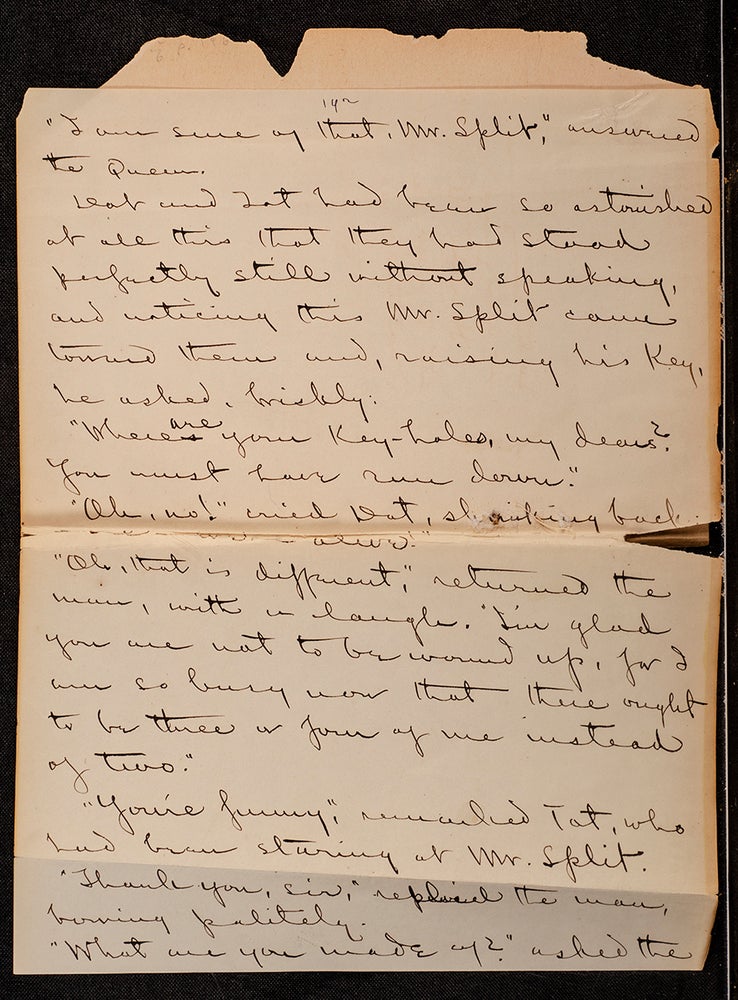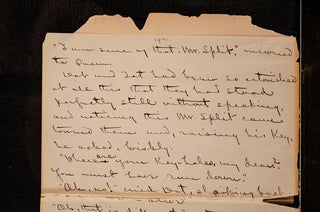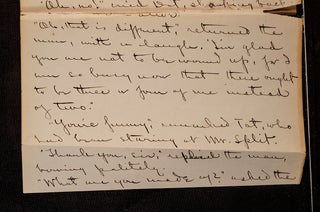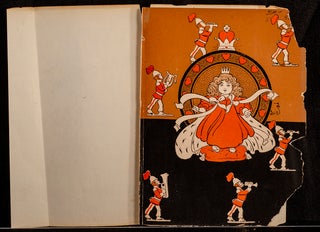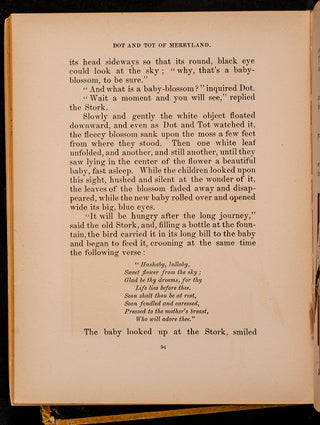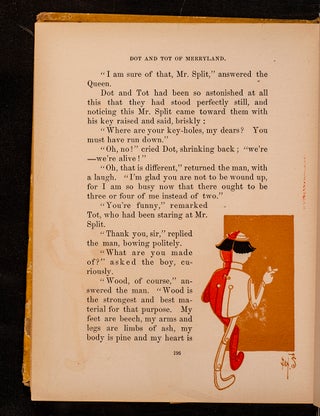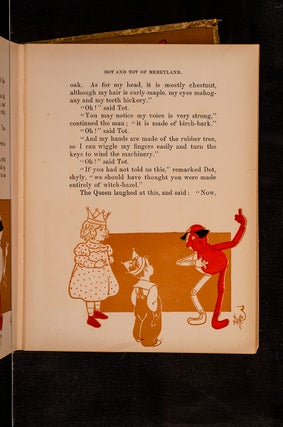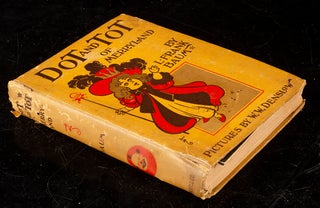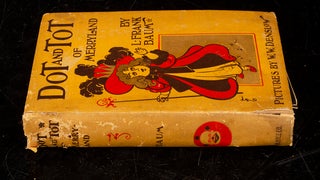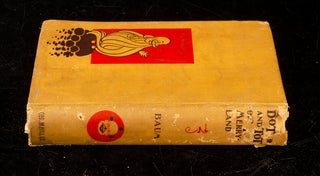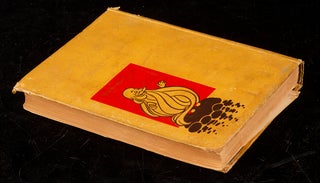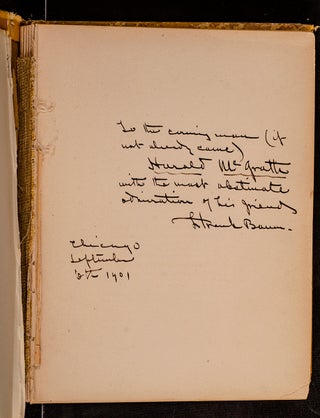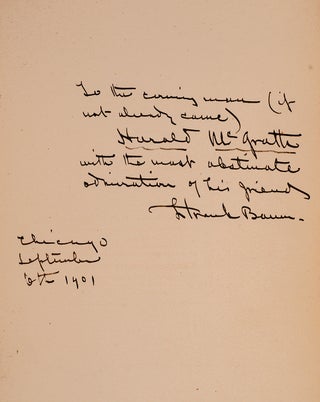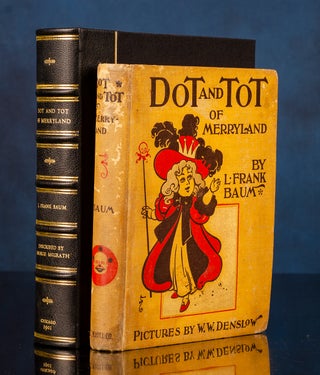Dot and Tot of Merryland
Chicago: Geo. M. Hill Co,, 1901. Item #05341
Inscribed by L. Frank Baum to Fellow Author Harold McGrath
With a Page of the Original Manuscript
BAUM, L. Frank. Dot and Tot of Merryland… Pictures by W.W. Denslow. Chicago: Geo. M. Hill Co., 1901.
First Edition. Small quarto (8 5/16 x 6 3/8 inches; 211 x 162 mm.). [viii], [13]-225, [226], [2, blank] pp.
Inscribed on recto of advertisement leaf "To the coming man if / not already came) / Harold McGrath / with the most obstinate / admiration of his friend / L Frank Baum. / Chicago / September / 6th 1901"
Publisher's pictorial tan cloth. Front cover pictorially decorated in red, black and gilt, rear cover pictorially decorated in red and black, spine decorated in red and black. Original pictorial endpapers in red, black and tan, front free endpaper chipped at edge. The front hinge and the spine extremities and corners have been expertly restored.
Housed in a felt-lined quarter black morocco over black cloth clamshell case, spine with five raised bands decoratively ruled and lettered in gilt in compartments.
Affixed to the verso of the front free endpaper is a folded page of the original manuscript containing the first twenty lines of page 196.
"I am sure of that, Mr. Split," answered / the Queen.
Dot and Tot had been so astonished / at all this that they had stood / perfectly still[without speaking,] / and (without) noticing this Mr. Split came / toward them [and,](with his key raised) raising his key, / (and said) he asked, briskly: /
"Where are your key[-] holes[,] my dears? / You must have run down."
"Oh, no!" cried Dot, shrinking back; / "We're--we're alive!" /
"Oh, that is different," returned the / man, with a laugh. "I'm glad / you are not to be wound up, for I / am so busy now that there ought / to be three or four of me instead /
of two." / "You're funny," remarked Tot, who / had been staring at Mr. Split. /
"Thank you, sir," replied the man, / bowing politely. /
"What are you made of?" asked the / [boy, curiously.] p. 196 the first twenty lines.
A fantastic presentation copy to a fellow major author where L. Frank Baum has included a fine page of his original manuscript.
Dot and Tot of Merryland is a novel by L. Frank Baum that published by the Geo. M. Hill company of Chicago in 1901. After Baum wrote The Wonderful Wizard of Oz, he wrote this story about the adventures of a little girl named Dot and a little boy named Tot in a land reached by floating on a river that flowed through a tunnel. The land was called Merryland and was split into seven valleys. The book was illustrated by artist W. W. Denslow, who had illustrated three previous Baum books. Unlike The Wonderful Wizard of Oz, Dot and Tot of Merryland contained no tipped in color plates, but was filled with colored text illustrations. There were four full page pictures. The book is the last Baum book that was illustrated by W. W. Denslow.
Evangeline "Dot" Freeland is sent to her rich father's country estate Roselawn for her health. She soon meets the gardener's son "Tot" Thompson, who becomes her friend and playmate. One day, they have a picnic and sit in a boat they find by the river, which gets away and takes them to a passage in a cliff face that brings them to the magical country of Merryland. Merryland is made of seven valleys, arranged in a circular pattern connected by a river running through them. The first valley is populated by clowns, the second is a land in which everything—including the people—is entirely made of candy, and the third the valley where babies grow from blossoms before storks deliver them to their parents. The fourth valley is populated by living dolls and is also the home of the Queen of Merryland, a large wax doll who makes Dot and Tot her adopted children. After Dot and Tot have a day of running the valley by themselves, the queen joins Dot and Tot to see the remaining three valleys. The fifth valley is populated entirely by cats, the sixth valley is run by Mr. Split, who makes wind up animals. The final valley is the Valley of Lost Things, where every lost item goes. Tot finds a doll he'd lost and is allowed to take it with him. The Queen decides to allow Dot and Tot to travel onward, which will take them back to Roselawn, but she will close the way to Merryland forever. Returning to the river, Dot is found by her father who notices that she no longer looks sickly. Tot deduces that the Queen of Merryland—who was either interrupted or forgot to answer when asked her name—must be named "Dolly."
Harold MacGrath (September 4, 1871 – October 30, 1932) was a best-selling and prolific American novelist, short story writer, and screenwriter. He sometimes completed more than one novel per year for the mass market, covering romance, spies, mystery, and adventure. He was the first nationally known writer to be commissioned to write original screenplays for the new film industry. In addition, he had eighteen novels and three short stories adapted as films, in some cases more than once. Three of these novels were also adapted as plays that were produced on Broadway in New York City. MacGrath traveled extensively but was always based in Syracuse, New York, where he was born and raised. As a young man, he worked as a reporter and columnist for the Syracuse Herald newspaper until the late 1890s, when he published his first novel, a romance titled Arms and the Woman. According to the New York Times, his next book, The Puppet Crown, was the No.7 best-selling book in the United States for all of 1901.
Price: $14,500.00

 I have been in the rare and antiquarian book business for over forty years; my family has been in the rare books business since 1876. Rare books are in my blood.
I have been in the rare and antiquarian book business for over forty years; my family has been in the rare books business since 1876. Rare books are in my blood.
